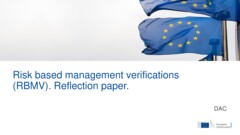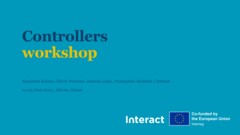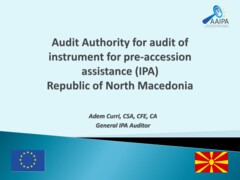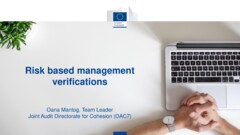Management verifications
Management verifications are an essential part of ensuring that EU funds are used correctly. They help confirm that operations comply with all EU, programme, and national rules, that costs are eligible, and that the activities supported by a programme have actually been delivered.
Management verifications are a responsibility of the Managing Authority (MA), but in Interreg, they are often delegated to controllers designated by each Member State. Project expenditures of each project partner, including a lead partner, must be checked by the MA or by a controller of the country in which they are based.
Effective management verifications are not just about control - they help improve the quality of implementation, ensure sound financial management, reduce errors, and build trust in the use of EU funds.
Where to start
Understanding the rules is the first step. Management verifications are defined in Article 74 of the Common Provisions Regulation (CPR), and apply across all EU shared management funds, including Interreg. The Interreg Regulation allows each Member State to appoint controllers for verifications on its territory. The MA remains responsible for ensuring that the system works well and fairly across the entire programme, including checks performed in different countries.
Key principles include:
- Risk-based management verifications: In the 2021-2027 funding period, management verifications shall be risk-based and proportionate - they shall focus on areas more likely to have errors or irregularities. The Commission's Reflection paper on Risk Based Management Verifications (Article 74(2) CPR) provides further insight into the proposed approaches to this topic.
- Two main types of checks:
- Administrative verifications: Desk-based checks of reported costs and supporting documents.
- On-the-spot verifications: Physical visits to confirm delivery of outputs or compliance with rules that can’t be checked remotely.
- Simplified Cost Options (SCOs): These significantly reduce the burden on both beneficiaries and controllers. When SCOs are used correctly, controllers do not check invoices or proofs of payments, but instead confirm that agreed activities have been performed and outputs and results have been delivered.
What we are working on
Interact supports Interreg programmes in developing and improving their management verification systems. We offer guidance, training as well as opportunities for exchange between Interreg Programmes:
- Risk-based verification methodologies: We support programmes in designing verification systems that are aligned with the regulations and tailored to their specific context. A Guidance on the risk-based management verifications and HIT methodology was developed as part of the HIT - harmonised implementation tools.
- Verification of Simplified Cost Options (SCOs): We provide practical advice on how to verify flat rates, unit costs, and lump sums. A Factsheet on the verification of SCOs and implications for control and audit has been published by Interact.
- Workshops and knowledge exchange: We facilitate regular events to help programmes share challenges and develop common solutions related to management verifications. Our latest events were:
- Certified training on Management verifications: A certified training on on Management verifications has been developed within the framework of Interact Academy. It is specifically designed to support controllers of Interreg programmes. The first two cohorts have already been completed, with a new one starting in the second half of 2025.
- Certified course Jems for Controllers: A fully self-paced and online certified course on Jems for Controllers is available on the Interact Academy. This course is tailored for controllers performing control work in Jems, either working in public control institutions or as private controllers.
To support management verifications in Interreg, we work towards harmonising approaches across programmes and provide a shared platform for exchanging experience, aligning practices, and identifying common standards of good practice, while ensuring that EU funds are used properly, with clear, efficient, and proportionate control processes.
Contact
For more information, please contact Alexandra Kulmer.
Want to exchange on this topic?
Interact offers an online space for those working with Management verifications in Interreg.
- Staff members of Managing Authorities and Joint Secretariats of Interreg programmes can exchange in the network on Financial management.
- Controllers can exchange in the Controllers network.
You can find out more about our MS Teams environment on our Networks page, and see all our networks in our Portal.









